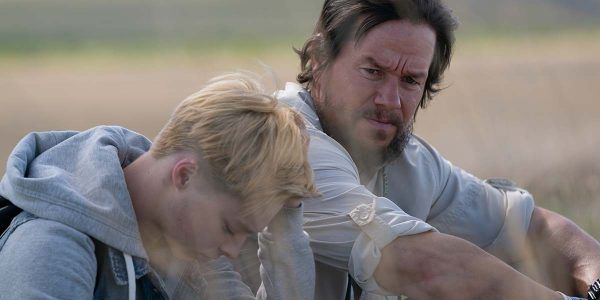It’s well worth spreading awareness about the true story of Jadin Bell and his father Joe, but sometimes that isn’t enough to justify a feature adaptation. While I’m sure the filmmakers’ hearts were in the right place, Reinaldo Marcus Green's film version of the Bell family’s story grossly misses the mark and winds up sending some very confusing messages in the process.
Good Joe Bell stars Mark Wahlberg as the title character, a father who decides to walk across America, from Oregon to New York, to speak out against bullying in support of his gay son, Jadin (Reid Miller). He’s got a lot to learn about truly understanding his son, processing his own emotions and figuring out how to best convey his message to inspire change, but Joe is committed to making it happen.
Diana Ossana and Larry McMurtry construct a mighty ambitious script here that begins with Joe already on the road before bringing us back to the events that encouraged Joe to go on the trip to begin with. On the one hand, this non-linear approach can play as a thoughtful examination of how one might approach a conversation if given a second chance, but on the other, it runs the risk of sending a dangerous message about what it might take to be fully understood by your loved ones. It’s a very delicate balance that Ossana and McMurty do find some success with, but it’s also a concept that doesn’t allow for room for failure, even in the slightest.
Good Joe Bell is at its best when Wahlberg and Miller share the screen together. While Wahlberg does handle Joe’s solo, highly emotional beats quite well, Miller is downright radiant as Jadin. Whether it’s a deeply moving scene or something a bit more fun-loving, Miller truly lights up the screen and brings the best out of Wahlberg in the process. Miller also has a phenomenal amount of chemistry with the rest of the ensemble, namely Connie Britton as Lola, Jadin’s mother, and Morgan Lily as Jadin’s best friend, Marcie. But one of the most powerful scenes of the bunch is actually a brief but extremely heartfelt exchange between Jadin and his little brother, Joseph (Maxwell Jenkins).
Director of Photography Jacques Jouffret captures those more intimate moments with delicately crafted handheld close-ups that amplify the performances and, in a sense, bring you right into the conversation. Jouffret applies that same level of specificity and attention to the physical requirements of Joe’s journey - the terrain, the elements and the importance of every possession he has with him. Editor Mark Sanger knows just how to maximize the cast’s work here as well. There are quite a few examples throughout Good Joe Bell when the choice to hold on an actor for just a few seconds longer makes all the difference.
Unfortunately, the moment Good Joe Bell becomes more Joe’s story than Jadin’s is where things become exceedingly unfocused, the movie unravels, and its message becomes diluted and jumbled in the process. While Wahlberg does manage to sell every single beat of this non-linear narrative, he still can’t cover up the fact that we’re missing some significant chunks of Joe’s journey, namely what’s really driving his decision to go on this walk in the first place. Is it a pure passion to advocate for anti-bullying? Is it a walk for forgiveness? Is it because he thinks it can help him manage the pain he’s suffering through? There’s no reason why they all can’t be in play here, but when you don’t have a clear understanding of where Joe’s head is at at the very start of it, it makes it difficult to track his growth and lessons learned.
While stuck in a world where homophobia and other biases still run rampant, I find myself desperate for more tools to inspire change - and as someone who lives and breathes movies, my tools are often films that send an inspiring message. This version of Joe and Jadin Bell’s story isn’t going to be one them, and that's a huge disappointment.
[Editor's note: The following contains spoilers for Good Joe Bell.]
For anyone who isn’t familiar with the true story, this last bit will be a spoiler, but it does feel necessary to address. The bullying Jadin experienced, drove him to take his own life. The Jadin we see on the road with Joe isn’t really there, something I suspect viewers will pick up on mighty fast, even if they don’t know the full story. On the one hand, raising awareness is vital but not if it means running the risk of suggesting that Jadin could only get Joe to understand him once he was gone. That thought crept into my mind early on, wound up being a cloud hanging over the entire film and then, in the end, when nothing concrete was conveyed about Joe’s growth and how we could use his message to keep the campaign going and spark change for the better, I was left feeling devastatingly empty.
Grade: C-


